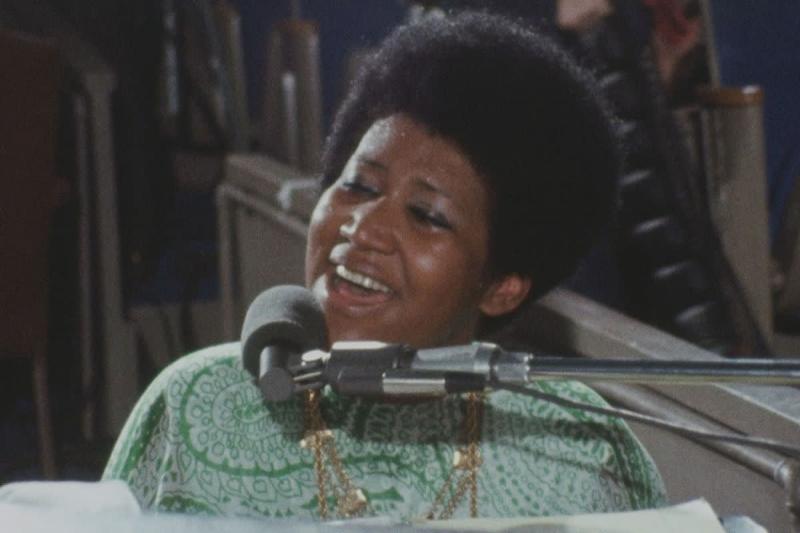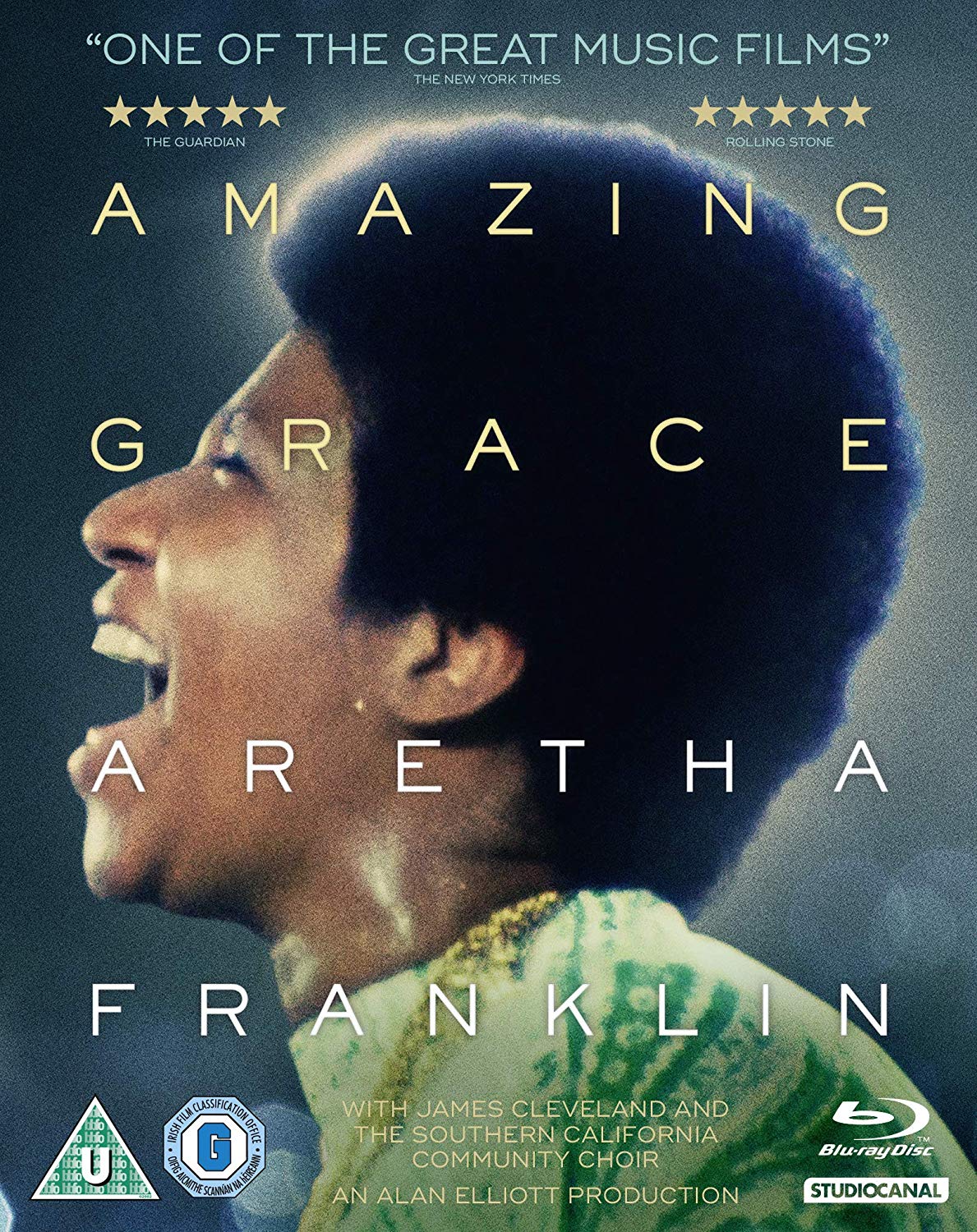DVD/Blu-ray: Amazing Grace | reviews, news & interviews
DVD/Blu-ray: Amazing Grace
DVD/Blu-ray: Amazing Grace
With Aretha: the best live music film ever?

Over two days in 1972, the great Aretha Franklin, undoubtedly one of the greatest American voices of the 20th century, performed and recorded gospel classics in Los Angeles, with a predominantly African-American audience, the red-hot Los Angeles Community Gospel Choir and the support of Rev James Cleveland.
Warners, who set the recording up, had the sessions filmed and brought in Hollywood director Sydney Pollack to direct. The result was lost for many decades, and only became available after the singer’s death, not least thanks to the steadfast commitment of producer Alan Elliott. The result is without question one of the most electrifying and moving live music films ever made. There is a communion of spirit between singers, musicians, audience that is breath-taking, possessed of a force that excites, transports and heals. The ecstatic reviews on the film's theatrical release earlier this year aren't in the slightest bit exaggerated: this is music for the soul that swings, rocks, comforts and makes you want to get up and dance.
 “Soul”, the music of Ray Charles, Otis Redding, James Brown, Carla Thomas, Etta James, James Carr, Wilson Pickett, Sam and Dave and many others, is just gospel in secular guise. Driven by the same spirit, these singers first sang in church. Though ostensibly about love and sexuality, soul is also about affairs of the heart in the most general sense – the heart that opens up in prayer, meditation and trance – when, as they say in gospel meetings, you “feel the spirit”. On one level, the film documents, with forensic attention, every step of the extraordinary mix of technique and abandon that goes into creating that exquisite feeling: as viewers, we are drawn in – through big close-ups of Aretha’s face, moved to tears by the energy pouring through her, her intimate interaction with James Cleveland, a major stylistic influence on her vocal style, and various wider shots of the choir, expertly driven by choirmaster Alexander Hamilton who coaxes unbridled passion from the singers, while never losing the perfect unison that makes their responses to Aretha’s calls irresistibly enjoyable.
“Soul”, the music of Ray Charles, Otis Redding, James Brown, Carla Thomas, Etta James, James Carr, Wilson Pickett, Sam and Dave and many others, is just gospel in secular guise. Driven by the same spirit, these singers first sang in church. Though ostensibly about love and sexuality, soul is also about affairs of the heart in the most general sense – the heart that opens up in prayer, meditation and trance – when, as they say in gospel meetings, you “feel the spirit”. On one level, the film documents, with forensic attention, every step of the extraordinary mix of technique and abandon that goes into creating that exquisite feeling: as viewers, we are drawn in – through big close-ups of Aretha’s face, moved to tears by the energy pouring through her, her intimate interaction with James Cleveland, a major stylistic influence on her vocal style, and various wider shots of the choir, expertly driven by choirmaster Alexander Hamilton who coaxes unbridled passion from the singers, while never losing the perfect unison that makes their responses to Aretha’s calls irresistibly enjoyable.
Each song builds with slow but irrepressible tension towards a series of climaxes, a tear-and-smile-filled ecstasy, shared among the musicians, singers and the audience. Such a paradox, given the suffering and pain that gave birth to this extraordinary music! The liberation of the heart and soul, and the images of rivers to be crossed, all of these were coded language for release from slavery and the violence of racial discrimination. This is music that transcends secular and spiritual, the personal and the political, engaging the body as well as the mind and heart.
The audience – which includes brief shots of Mick Jagger, looking at times transported and at others a little embarrassed – are full participants in the ceremony: James Cleveland asks them, before the first session begins, to “give vent to the spirit” and of course they do. As in all musical forms with roots in Africa, the audience aren't just out there, watching and listening, but they are integral to the magic that unfolds at every moment, echoing the emotion summoned by Aretha, her musicians and choir, and simultaneously nourishing her with their shouts, handclaps, "testifying" and dancing.
The film is touching as well in every detail – members of the choir overwhelmed by the emotional force of Aretha’s singing; vocals that dare go right to the brink of the possible and hover on the edge of a scream, some of them so moved that their eyes are flooded with tears; the Rev CL Franklin stepping proudly up on stage, and wiping the pearls of sweat from his daughter’s brow; and bass-player Chuck Rainey, cool and impassive in the gospel storm, providing the solid ground that this wild music demands.
There is a moment about two-thirds of the way through when the intensity fades a little, but this doesn’t in any way take away from the passion and ecstasy that flow through so much of the film, much more than a record of the making of Aretha’s most successful album, but an invaluable demonstration of the healing power of music, the effect of which is probably impossible to communicate in words.
rating
Explore topics
Share this article
The future of Arts Journalism
You can stop theartsdesk.com closing!
We urgently need financing to survive. Our fundraising drive has thus far raised £49,000 but we need to reach £100,000 or we will be forced to close. Please contribute here: https://gofund.me/c3f6033d
And if you can forward this information to anyone who might assist, we’d be grateful.

Subscribe to theartsdesk.com
Thank you for continuing to read our work on theartsdesk.com. For unlimited access to every article in its entirety, including our archive of more than 15,000 pieces, we're asking for £5 per month or £40 per year. We feel it's a very good deal, and hope you do too.
To take a subscription now simply click here.
And if you're looking for that extra gift for a friend or family member, why not treat them to a theartsdesk.com gift subscription?

Add comment